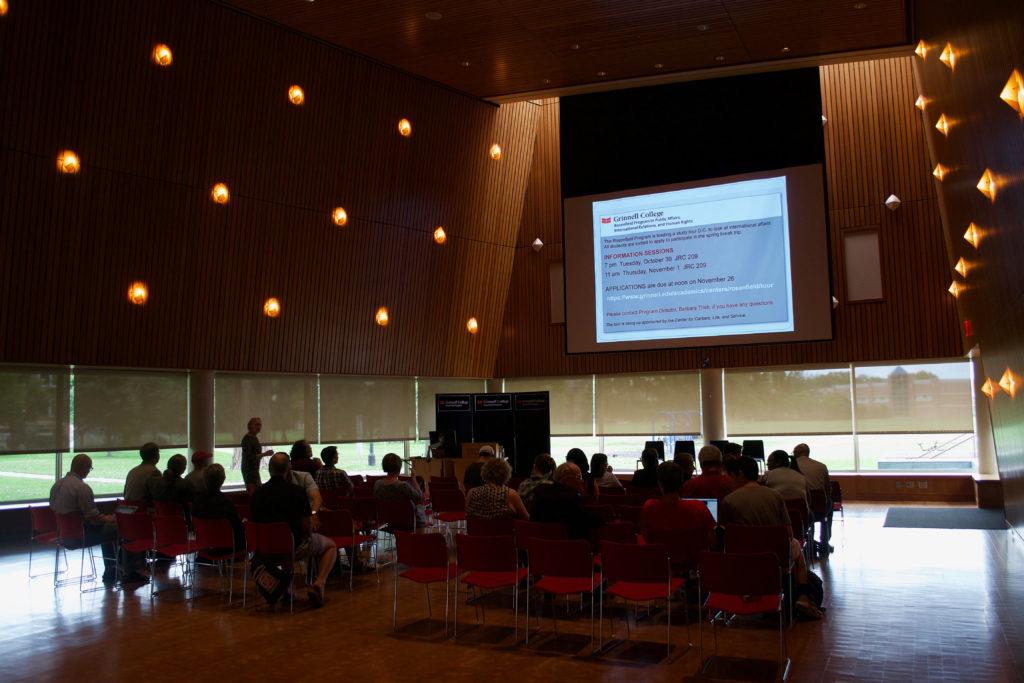By Mayo Sueta
suetamay@grinnell.edu
On Thursday 11 a.m., Juliet Macur, a sports columnist for the New York Times, kicked off the “Off the Field” Symposium, an event organized by the Rosenfield Program, cosponsored by the College’s Athletics Department, the Center for Careers, Life, and Service (CLS) and Health Professions Advisory Committee (HPAC).
The symposium, which will continue into next week, discusses the intersection of sports with politics, economics and society.
Macur often “writes about issues that transcend sports,” according to her guest biography. During her panel, she discussed stories that she has written which touched on social, political and cultural issues as well as sports. Through going into detail about specific stories, Macur stressed the importance of “seeing life through the lens of sports,” which she mentioned was what “this whole symposium is really about.”
She first became a sports journalist because she was attracted by the idea of being able to travel and meet people as part of her job and cover big stories right away.
“The problem of that, which is still the case, is that I don’t like writing about games, I [want to] go beyond the X’s and O’s of these sporting events, so I had to go find stories that really had nothing to do with sports and had everything to do with society … and it turned out to be okay!” Macur said in her talk this past Thursday.
To Macur, sports stories that transcend sports come to her in different ways. “Sometimes you gotta find the stories … and sometimes the stories that transcend sports find you,” she said.
One story she actively sought out was about two men who were part of the National Guard unit during the Iraq War, who had become friends through playing football.
Their job was to find and diffuse roadside bombs in Iraq and, when their Humvee drove over a bomb, one of the men was killed and the other lost a leg. Macur found that the one who had been killed had written a letter to a Congressman telling him that his unit was “ill-equipped to be [in Iraq].”
“‘We are not prepared to fight in this war, and … some of us might get hurt and die here because of it,’” she said, quoting the letter. “[The] story turned out to be so much bigger than just … guys-playing-football-going-over-to-fight-together story, it turned out to be a story that questioned … how America was preparing our troops for war.”
As an example of a story which found her, she mentioned a piece about the NFL cheerleaders, where five Redskins cheerleaders approached her to talk about their experience during a trip to Costa Rica where they had their passports taken away and were made to serve as personal escorts, among other things.
“The story … started out as a cheerleading story and turned out to be a story about workers’ rights and equal rights,” Macur said. “I was talking to one of my editors about it, and I said, ‘You know what, I never really dreamed that I would be on the cheerleader beat,’ and he said, ‘You know what, you’re not on the cheerleader beat, you’re on the harassment beat.’”
Macur also discussed the story about Colin Kaepernick who knelt during the national anthem at an NFL preseason game and spurred discussion about patriotism, as well as the story on Lawrence Nassar, a child molester who was the USA Gymnastics national team doctor and osteopathic physician at Michigan State University, bringing up questions about “how institutions treat their athletes.”
Another story she discussed was about Ryan Hoffman who suffered from chronic traumatic encephalopathy, but did not get sufficient help for his condition. Hoffman’s story highlighted the lack of public policy on such issues. She ended her discussion with a story on a sports coach in Madison, Indiana who works to keep his players from choosing suicide and drugs in a town where such issues are especially prevalent.
Macur used all these examples to highlight the power of sports. “Sports means something more now, sports has caused people to stand up and pay attention,” she said. “Everybody is listening to what sports are saying.”
Macur’s panel was followed by Marc Edelman’s 4 p.m. panel, “College Athlete Rights and the Need for NCAA Reform,” and a panel discussion at 7:30 p.m. called “Militarism, Patriotism, Nationalism and Sport” by Michael Butterworth of the University of Texas, Sarah Fields of the University of Colorado and Luis Moore of Grand Valley State University. The symposium will continue into next week where, at 7:30 p.m. on Monday, Nola Agha will discuss how new stadiums are financed with an interest in distributive justice, and at 7:30 p.m. on Tuesday, Mike and Kim Adamle will talk about traumatic brain injuries.
“I’d like people, even those with no inherent interest in sports and athletics, to appreciate the complexity of sports and how they connect to the important questions of the day,” wrote Barbara Trish, political science, in an email to The S&B.
“Rosenfield symposia — in the abstract — are vehicles for the exchange of ideas. They allow people from who are scholars and practitioners from outside of our campus community to challenge us with ideas — but they also allow the campus to communicate with these visitors,” she wrote. “We like to say that the symposia ‘bring the world to Grinnell.’ Yet at the same time, they bring Grinnell to the world.”




































































